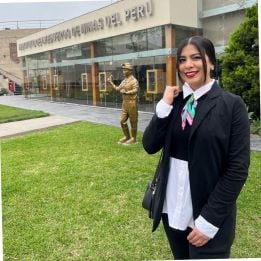

Legal, environmental and regulatory coordinator | Grupo Peñoles



Salma Hernández Salas
Legal, environmental and regulatory coordinator | Grupo Peñoles
How do you approach managing legal aspects during periods of instability or crises, and how does your legal strategy align with the broader business strategy to ensure the organisation’s resilience?
In my day-to-day life, I manage periods of crisis by prioritising tasks to achieve the desired goal, since with this I can delegate urgent actions and focus on it for resolving the problem. Also is important to manage our energy, because nowadays we are very prone to burnout, so it is essential to equilibrate crisis at work so we can think of solutions. Legal strategies must be always aligned with the company’s objective and the interests it has, so they are analysed to cover all the necessary edges. I do this working collaborative with my team members considering the risk factors that the problem in question has and the internal and external management must be given.
What are the major cases or transactions you have been involved in recently?
I have been mainly involved in the implementation of legal strategies for new group projects, which entails the analysis of applicable legislation, the risks of the project and the mitigation of these to find sustainable solutions for the company and carry out the project. Likewise, the determination of legal actions is based on the analysis of reforms in legislatures that affect direct negotiations. This has brought me enormous challenges, since there are currently many changes in the law that bring with them the search for solutions and mitigation of complicated risks for core business.
What measures has your company taken to embed sustainability practices into its core business operations, and how does the role of the general counsel contribute to driving and ensuring sustainable practices within the company?
Currently, the company has adopted good practices in sustainability issues to contribute to specific actions in the field of Environmental, Social and Governance (ESG); some of these being the following:
The responsible use of water, implementing the use of treated wastewater in its processes, which directly helps to reduce the exploitation of the resource and, in turn, to the business budget since it lowers the costs of paying rights for concessioned water.
Management of mining waste, mainly, so that it can be used on site as mine fill and for construction of tailings dams. This prolongs the useful life of the dam and, in turn, reinforces the commitment to the circular economy to give a second life to the waste generated in the industry.
Collaboration with communities surrounding mining projects, which allows promoting social investment, especially in matters of local employment and support for social programs to provide health resources and services that, due to the remoteness of the projects and communities, are not always provided in the best way.
Likewise, in governance issues, there is a corporate ethics and values committee, which serves as a supervisory means for compliance with the Code of Ethics and Conduct.
In all the previous points, the role as lawyers is essential; especially in my area, where we mainly attend environmental, social and regulatory issues, we have a direct participation so that, through legal strategies, the corresponding permits are obtained in accordance with the applicable legislation and with this, we are in a position to achieve the objectives to continue with the commitment to be a socially and environmentally responsible company.
How do you prioritise diversity and inclusion within your legal department, and what initiatives have you implemented to foster a more inclusive and equitable work environment?
Within the team, freedom of expression and thought is encouraged; mainly, on gender issues, since being within an industry where it has historically been operated by men, I promote the participation of female colleagues in forums, associations and programs that give exposure to female lawyers in the legal department. The initiatives that I have put into practice with my colleagues have been the following:
Promote participation in associations where female talent is promoted, such as Women in Mining Mexico, within which there is the opportunity to exploit talent and, in turn, connect with women in this industry internationally.
Explain in daily conversations the importance of giving opportunities to women and LGBT+ people, since, despite current progress, we continue to fight for parity in labor issues. This leads me to connect and empathise with the diversity of thought in the teams and with all the people who work in the organisation.
Likewise, when having interviews for a vacancy in the area, I promote objectivity due to the talent, knowledge and ability of the person applying, since this reduces the chances that only certain types of profiles will be considered to be part of the team under discrimination.
Finally, another step that I consider important is to provide information tailored to the topics that I know and am interested in sharing, since sometimes ignorance on issues of gender equality and inclusion generates biases that can hinder opportunities for women, people with different abilities and people from the LGBT+ community.